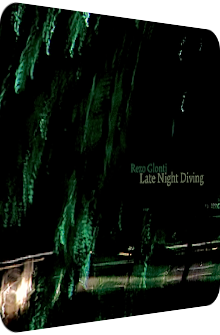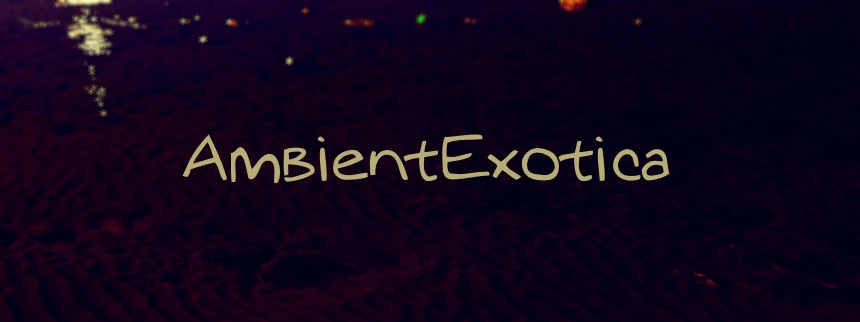
Rezo Glonti
Late Night Diving
2013
Late Night Diving is a four-track EP by the Georgian sound designer Rezo Glonti, released in July 2013 on Kate Carr‘s Sydney-based Flaming Pines label and purchasable on the label website. One particular thing has to be said as early as possible: this delightful work has completely turned my synapses upside down, a fact I should not brag about too much, although it proves the magnitude of utter magnificence Glonti’s EP unleashes. I leave it at that for the moment, as I rather not want to give the major impressions and unexpected shifts of it away in the opening paragraph already, but rest assured that this work is unlike anything that I expect by the look of all extrinsic things. Kate Carr is known for coming up with press texts that are as meticulous as they are poignant, but here Glonti’s surroundings do not seem to fit with the sound layers themselves. One important key in understanding and uncovering the EP is the neglect of its title. Yes, it really comes down to this. I do not want to belittle – let alone falsify – Glonti’s title-related choice, but I for one feel as if I were listening to a gargantuan sunburst of multitudinous colors, benign synth spirals and mellifluous Drone washes. Turns out that my gut feeling is horrifically incompatible with a title like Late Night Diving. But I cannot help it. Fair enough. I will carve out this surprise level later and throughout the review. In the meantime, there is an explanatory revelation in the press text, a quote by Rezo Glonti himself, one that shall end this introductory paragraph, as I deem it essential: "‘I realised that despite the regime and the banning of certain things, people were happy and happiness and joy is universal and timeless, no matter when you live and where you live.’’
I remember my initial thought when I first encountered the title of the opener which is named Soviet White. Having no personal connections whatsoever to the formerly Soviet regions of the world, my mind already built a virtual aural presumption. I originally expected this composition to be traversed by particularly frosty and grim Drone structures, and it does not take an overly intelligent person to draw the same interim conclusions. The actual arrangement of Soviet White nullifies and annihilates these thoughts. Its slow fade-in phase is nothing unusual per se, as this is applied to the vast majority of openers on Ambient albums, but here the thinness of the point of origin already glows in fiery orange colors, emanating a thermal heat source whose majesty is only partially coated in the well-known corset of nostalgia, with most of its physiognomy reigning freely over these apparitions of the past. The monotonous drones are silky and embracing, complemented by the archetypical crisp Glitch crackles I may have originally expected, but not in this glowing aura. Synth strings are soon towering above the fluxion, an altered arpeggio of a guitar vesiculates over, under and in-between the setting. Even the heftily bubbling fade-out phase cherishes the euphony and leaves a baffled reviewer behind. This could have been included in Kompakt’s Pop Ambient series with ease. Very cosmopolitan and amicable. In Soviet White, Rezo Glonti augments the joyful emotional range of electronic music.
Follow-up Sub Numbers (listen to it on SoundCloud) is equally densely layered, but guides the listener through a translucently effulgent crystal antrum of stereo-panned brazen hiss, oscillating guitar specks and sylphlike synth synadelphites whose sparkling loftiness is pristine and purified. Instead of a monotonous lead drone, here the melodies, plinking prongs and afterglows interact. Piano sprinkles, acoustic guitar licks and deep bass coatings ameliorate a magic state of insouciance. The term dreamscape is usually ubiquitous and found aplenty on the web. Here it is deeply entangled. It is the most fitting term I can think of which astutely describes the sumptuous rapture this piece spawns. Naturally, one has to hear it in order to believe it. It is quite a dominant shift in terms of the opener. All in all: a gorgeous cavity! And, I might add, one that won’t be left during the following two installations, as Glonti has now found the very niche which he then rearranges and reinterprets throughout the EP.
Day Light Signals luckily resides in the same aeriform textural realms as Sub Numbers, but pushes its interstitial structures to transmutational states. Glonti lets this track evolve into something else, making this the most progressive piece despite the shortest runtime below four minutes. First uniting gelid ice crackles with hibernal exhalations in-between a flute-accentuated New Age-oid stream of gaseous mellowness, Day Light Signals is then equally keen on displaying the polymorphous undulation of the synths, letting their billows rise and fall. Northern light gleams and humane dark matter pads coalesce, become entangled in a heterodyned runlet and dismiss all the former harsh frequency ranges by only keeping the most mellifluous ones. It turns out that this third track is much more cosmic and only slightly tenser, but its greatest characteristic trait is its progressive aura. The Georgian producer interweaves cavalacades of hues and timbres, and yet the result never feels overloaded or meaningless.
The grand finale Sun Of Tibati encapsulates the largest globs of yearning and hope in another ethereal corker. The New Age feeling gets revved up, and although it is crystal clear that Rezo Glonti is undoubtedly the man behind this particular tune due to the delicately diffuse synth aortas and their ultra-long sustain phases, the characteristics of the late 70’s are also apparent in here, for instance the silkened splashes and piano helixes. Notwithstanding their clearness, Sun Of Tibati creates a flow that is almost cyber-tropical. The constant tape hiss mimics rivers and smaller cascades, the stupefying synth eruptions boost the impression of being in a neon-colored grove of paradise, the arpeggiated three-note coils inherit the right amount of moisture to refresh the listening subject rather than being perceived as a frosty element. Even when the song fades out, its utterly languorous, maximally enchanting superstructure shimmers through the dark. Diving through the stacks of synths seems more possible than ever. But it is no late night diving as the title of the EP suggests: it is a dive through a sanctuary shelter and an abundance of rivers of bliss.
Late Night Diving has hit me enormously, and neither can its synth-fueled wonderlands be exclusively blamed for this wondrous surprise, nor the endemic iridescent glitz which embraces the listener time and again. No, I believe this bedazzling impression is caused by the constant annulation of the extrinsic factors as well as the EP title! So let me recapture this shortly: Rezo Glonti moved houses during the production of this EP. Stress and suspense are but two of the unwanted emotions caused by this tedious string of organizational burdens. And then the following sentences of Kate Carr’s press text come to mind: “Late Night Diving is an EP about changes, and struggles big and small. The struggle for national independence; the struggle to find a home. The struggle to change, and the struggle to stay the same. The struggle to remember and to forget.” No matter how hard I try, I cannot find any of these incidents, instances and interstices in the EP itself. No struggles detectable. This turns out to be a wonderful boon. Rezo Glonti is fully able to create a downright magical world no matter how pesky and soul-crushing the outermost boundaries of the music itself are. Perhaps this is the most important lecture to take with me. Late Night Diving is one of the most congruent and shimmering, completely carefree and elevating works that ever graced the Flaming Pines label. The opener Soviet White already circumvented my expectations, and yet it is the standout track due to its different texture base frame. The remaining three tracks are fully compatible to each other, Glonti mercilessly drives the phantasmagoric allusions further. “How much dreaminess can I create?” he seems to ask himself. I am too astonished to give a definite answer other than that Late Night Diving is a glistening gem with no nocturnal implications whatsoever.
Further listening and reading:
- You can order Late Night Diving on the Flaming Pines homepage.
- Listen to the track Sub Numbers on SoundCloud.
- Follow Flaming Pines on Twitter: @FlamingPines.
Ambient Review 243: Rezo Glonti – Late Night Diving (2013). Originally published on Jul. 24, 2013 at AmbientExotica.com.
